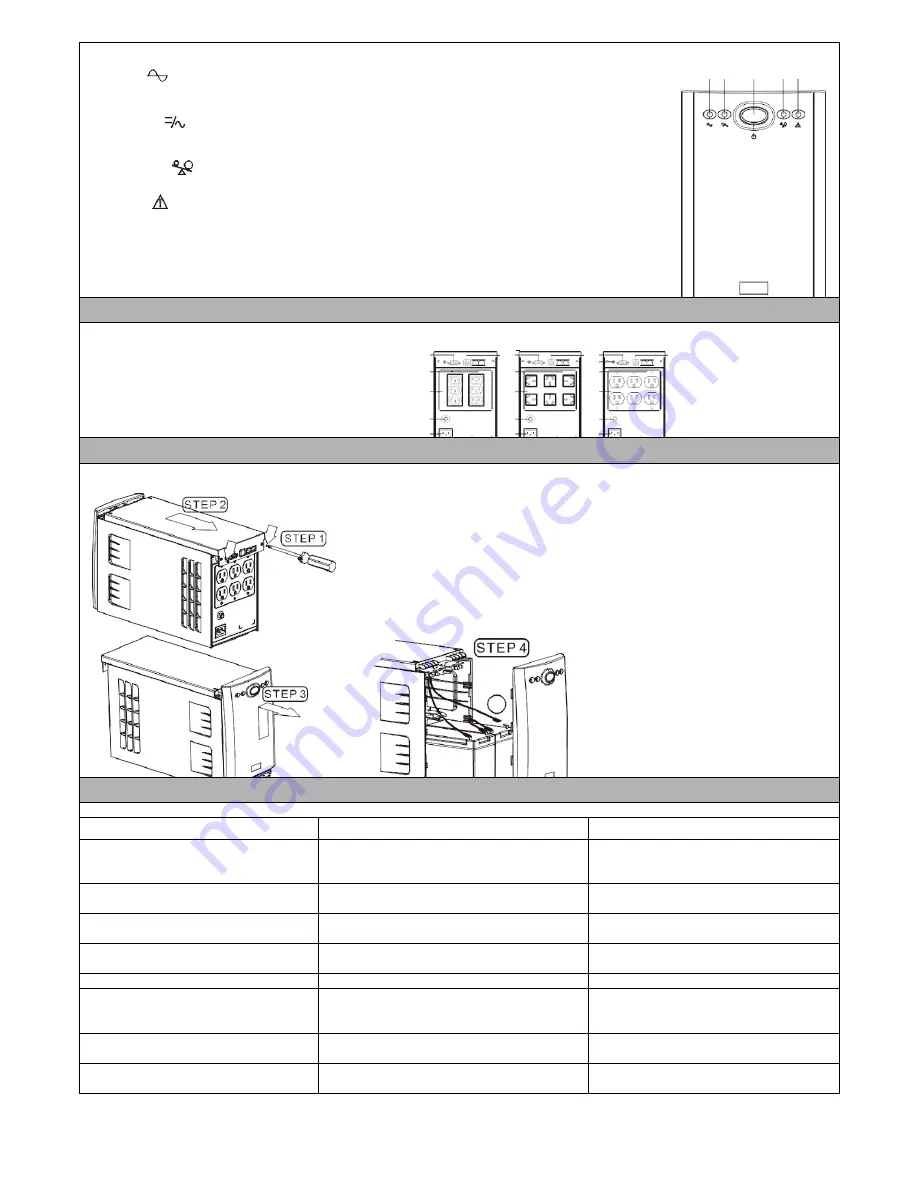
1. Line LED (
)
:
Green LED remains standstill when Utility is normal.
Green LED flashes every 0.5 seconds when the UPS is in Battery charging mode.
2. Inverter LED (
)
:
Yellow LED flashes every 3 seconds and simultaneously buzzer alarms continuously when Utility failure.
Yellow LED flashes every 0.5 seconds and buzzer alarms every 0.5 seconds when UPS is in battery low condition.
3. Overload LED (
)
:
Red LED remains standstill and simultaneously buzzer alarms continuously when the UPS is in overload condition.
4. Fault LED (
)
:
Red LED remains standstill when the UPS is fault.
5. Main Switch
:
a.
To Control on/off the UPS when Utility is normal.
b.
To
enable “DC-Start” Function when Utility fails. (To enable DC Start properly, you are recommended to connect
<80% output load with the UPS only)
P.S. Make sure the computer connected to the UPS is switched on before enable the "DC-Start" function. You are not
recommended to add some other computer or peripherals after DC-Start function is activated.
1
2
5
3 4
REAR PANEL EXPLANATIONS
1. AC Inlet
3
6 3
6 3
6
2. Backup Outlets: 6pcs NEMA5-15R ,Local socket or IEC320
5
4
4
4
3. True RS232 interface port(Optional)
4. RJ11/RJ45 Jacks: MODEM /LAN Protection
2
2
2
5. Site Wiring Fault Indicator: For 115/120Vac system only.
6. USB Interface(Not supplied, if the RS232 interface is built)
7
7
7
7. Input fuse.
1
1
1
REPLACING THE BATTERY
Note
:
Once the battery is disconnected, the loads are not protected from power outages.
1. Use a cross-type screwdriver to remove the two top cover screws and slide back the cover
Please refer to the figures STEP 1 through STEP 4.
2. Gently Pull the batteries out of the UPS.
3. Loosen the black wire from the negative (-) terminal and red wire from the positive (+)
terminal.
4. Connect the battery leads to the new batteries.
5. Note: Small sparks at the battery connectors are normal during connection.
6. Slide the batteries into the UPS.
7. Close the front panel and fasten two screws.
8. Dispose of the old batteries properly at an appropriate recycling facility.
-
TROUBLE SHOOTING
When your UPS malfunctions during operation, you may check the list below for proper adjustment. If the adjustment still be in vain, please contact your sales agent for help.
Situation
Check Items
Solution
Mains normal but 'Line' LED is not on.
1. Is the power switch on?
2. Is the power cord loose?
1. Press Main Switch on.
2. Change fuse with same rating.
3. Re-connect the power cord properly.
'Inverter' LED flashes every 2 seconds but no
output
Battery voltage is too low
Recharge the UPS for 24 hours.
Alarm buzzer beeps continuously when Utility is
normal.
Check to see load status if it is in overload.
Remove some uncritical load.
Alarm buzzer beeps for 10 seconds, then the UPS
is turned off
Remove some uncritical load and re-switch on the
UPS.
No LEDs display on the front panel
Consult with your sales agent For help.
UPS dose not provide expected back up time.
1.
The UPS’s battery is weak due to recent outage.
2.
The UPS’s battery is near the end of its service life.
1. Charge the battery.
2. If the battery is near the end of its service lift,
consider replacing the battery.
The UPS operates normally, but the site wiring
fault indicator is lit.
Building wiring error such as missing ground or hot to
neutral wire reversal.
Have a qualified electrician correct the building
wiring.
UPS switch on then connect Utility, but UPS is
unable to work under Utility mode
Is the Utility normal?
If Utility is normal, connect Utility first then restart
UPS.
Summary of Contents for HURON PRO HR1000
Page 1: ...HURON PRO HR1000 HR1500 User Manual ...
Page 4: ......






















